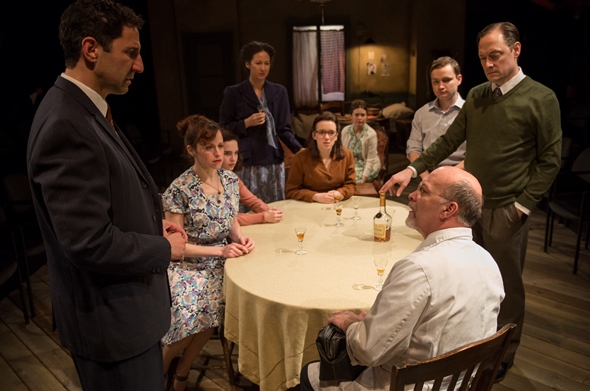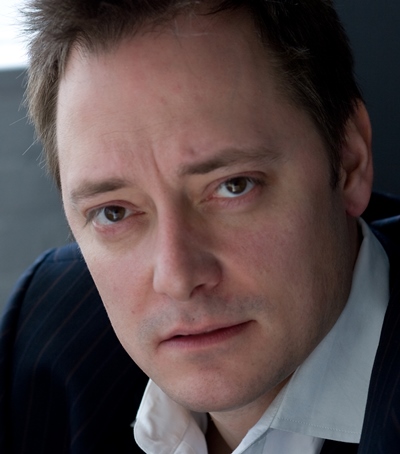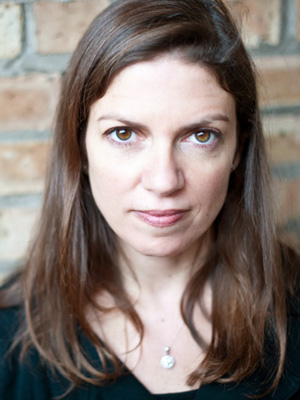Role Playing: Lance Baker embodies the ennui, despair of fugitive Jews in ‘Diary of Anne Frank’
 Interview: As a Jewish businessman suddenly bereft of a purpose and hiding from Nazis, the actor focuses on isolation in the production at Writers Theatre. Through Aug. 16.
Interview: As a Jewish businessman suddenly bereft of a purpose and hiding from Nazis, the actor focuses on isolation in the production at Writers Theatre. Through Aug. 16.
By Lawrence B. Johnson
Of the eight Jewish characters huddled together against the Nazi terror just beyond the door of their little room, in “The Diary of Anne Frank,” one of them arguably feels the confinement, the boredom, the uselessness more than the others. He is Mr. van Daan, a business associate of Anne’s father; and Lance Baker, who portrays this restive soul at Writers Theatre, sees him as a man marginalized in his own heart.
 “Van Daan comes in as optimistic as anyone can be under the circumstances,” says Baker. “He has found a hiding place and he was involved in setting it up to make it a home for everybody. But it quickly becomes clear to him that his actual role in this extended household is greatly diminished from the responsibilities he’s always been accustomed to in the business world. Once they’re settled in, there aren’t that many decisions to be made, and Frank (played by Sean Fortunato) will be the one to make them. Van Daan finds himself floating and lost.
“Van Daan comes in as optimistic as anyone can be under the circumstances,” says Baker. “He has found a hiding place and he was involved in setting it up to make it a home for everybody. But it quickly becomes clear to him that his actual role in this extended household is greatly diminished from the responsibilities he’s always been accustomed to in the business world. Once they’re settled in, there aren’t that many decisions to be made, and Frank (played by Sean Fortunato) will be the one to make them. Van Daan finds himself floating and lost.
“He very quickly isolates himself – smokes, carves a menorah and wonders what happened to his life. As that box housing two families – and the dentist Mr. Dussel – gets tighter, van Daan has momentary blowups. And of course he explodes at Anne, the protagonist the audience has bought a ticket to love. He’s the perfect foil for Anne (Sophie Thatcher), this bright and energetic girl who’s always in everyone’s face. Which means I’m the one hitched to the role of the person who calls her out: ‘Why can’t you keep still, be quiet, be more like your sister?’”
 The play, adapted by Wendy Kesselman, recalls the desperate and intense two-year period when Anne Frank, together with her father, mother (Kristina Valada-Viars) and sister (Lila Morse) hid from the Nazi’s round-up of Jews for deportation from Amsterdam to concentration camps. The Frank family was joined by Mr. and Mrs. van Daan (Heidi Kettenring) and their son Peter (Antonio Zhiurinskas). A dentist called Dussel (Kevin Gudahl) later brought their number to eight. In the end, they were all discovered and shipped to the camps.
The play, adapted by Wendy Kesselman, recalls the desperate and intense two-year period when Anne Frank, together with her father, mother (Kristina Valada-Viars) and sister (Lila Morse) hid from the Nazi’s round-up of Jews for deportation from Amsterdam to concentration camps. The Frank family was joined by Mr. and Mrs. van Daan (Heidi Kettenring) and their son Peter (Antonio Zhiurinskas). A dentist called Dussel (Kevin Gudahl) later brought their number to eight. In the end, they were all discovered and shipped to the camps.
Writers’ production takes place in the tiny backroom venue at Books on Vernon in Glencoe. Baker says that after several dozen performances, the actors began to feel not just the actual limitations of space and physical movement, but also the sense of daily sameness that must have worn on that little band of fugitives.
“It’s a two-year story in a hundred minutes,” he says. “If, like a prisoner, you mark every performance with a hashtag, you begin to embrace the confinement. As an actor, you’re chafing at the constraint and looking for some other input, for something else to happen. You’re sucking up everything around you and using everything you can get.”
 The tedium for van Daan, says Baker, is amplified by his inescapable sense of uselessness.
The tedium for van Daan, says Baker, is amplified by his inescapable sense of uselessness.
“In those days, it was the male who went out and did the work and got the money,” he says. “Here, there are only domestic duties, and his wife takes care of most of that. But even more importantly, when van Daan was working in the factory, he had a position of authority, with people working under him. Now, there aren’t as many of those kinds of decisions to be made, and Mr. Frank ends up making them all. He’s the guy everyone turns to.
“Van Dann is a good man at heart who wishes he could contribute more. The challenge for me as an actor is how to get the audience to empathize, to relate, to this isolated man. Even if I’m playing a villain , I want the villain to have human characteristics – to show the qualities, good and bad, that dwell in all of us. That’s part of our glory as a human race.”
Sometimes, the distressed man vents his frustration at his wife, though he unquestionably loves her. Baker’s comment on those flare-ups begins with an unexpected burst: “I’ve been having the best time! I can’t say enough about working with Heidi, who is so capable and empathetic. We are so together on the situation where we’re screaming at each other one minute, and five minutes later we’re very affectionate and still quite madly in love.
 “The two of us are in many ways the classic pre-war family – Mrs. van Daan is the more gregarious and makes sure the social calendar is full, and decides what to do with the money the man goes out and stoically makes. That isn’t me, by the way. I could happily be a stay-at-home dad for the rest of my life. It’s a very lonely life if you make it all about work.”
“The two of us are in many ways the classic pre-war family – Mrs. van Daan is the more gregarious and makes sure the social calendar is full, and decides what to do with the money the man goes out and stoically makes. That isn’t me, by the way. I could happily be a stay-at-home dad for the rest of my life. It’s a very lonely life if you make it all about work.”
If there’s a tipping point, where van Daan’s emptiness turns to petty bitterness, it comes when Mrs. Frank is cutting a small dessert into eight pieces and van Daan accuses her of making the piece for her husband just a tiny bit larger. There’s barely enough food for these eight shut-ins to survive on, and van Daan, with too little on his mind, has become preoccupied with his hunger.
“I love that moment,” says Baker. “It’s really a moment of great ambiguity. I went into it thinking it was a comic moment. You know, van Daan is always obsessed with food, and isn’t he funny? It’s always my first impulse to get a laugh. But the line didn’t get a laugh. What we really have here is people locked in a room together, suffering through the drudgery of every individual day, seeing how far they can push each other. And for van Daan, hunger has gone past the physiological to the psychological. Hunger must be the most primal motivator.”
 Between the grim issues of hunger and anxiety, “The Diary of Anne Frank” might appear to be the stuff of pretty bleak theater. But that, says Baker, is exactly what director Kimberly Senior didn’t want.
Between the grim issues of hunger and anxiety, “The Diary of Anne Frank” might appear to be the stuff of pretty bleak theater. But that, says Baker, is exactly what director Kimberly Senior didn’t want.
“She was deeply afraid of people coming in and expecting a dirge,” he says. “She wanted to fill the play with love, light and laughter. We all have this capacity to pull together and survive in the most desperate of conditions – even if we are all taken by a force beyond our control. Amid the hardship and fear, this story expresses a tangible joy.”
Related Links:
- Review of ‘The Diary of Anne Frank’ at Writers: Read it at ChicagoOntheAisle.com
More Role Playing Interviews:
- Francis Guinan embraces conflict of father who fled from grim truth in ‘The Herd’
- Sophia Menendian reached back (but not far) as plucky Armenian refugee of 15
- Lindsey Gavel’s distressed Masha, in ‘Three Sisters,’ began with a touch of cheer
- Hollis Resnik felt personal bond with zealous, skeptical scholar in ‘Good Book’
- A.C. Smith is ready undertaker, lord of diner world in ‘Two Trains Running’
- Lia D. Mortensen’s intense portrait of a mentally failing scientist holds mirror to life
- Siobhan Redmond sees re-formed Lady Macbeth as valiant queen in ‘Dunsinane’
- Eileen Niccolai harnessed a storm of emotions to create spark in Williams’ Serafina
- Steve Haggard, aiming at reality, strikes raw core of grieving man in ‘Martyr’
- Shannon Cochran found partners aplenty in sardonic, twice-told ‘Dance of Death’
- Natalie West scaled back comedy to nail laughs, touch hearts in ‘Mud Blue Sky’
- Dave Belden, actor and violinist, adjusted pitch for ‘Charles Ives Take Me Home’
- Joseph Wiens starts at full throttle to convey alienation of ‘Look Back in Anger’
- Shane Kenyon touches charm and hurt of lovable loser in Steep’s ‘If There Is’
- Ramón Camín sees working class values in Arthur Miller’s tragic Eddie Carbone
- Hillary Marren’s charming, rapping witch in ‘Woods’ shapred by hard work, free play
- Mary Beth Fisher embraces both hope, despair of social worker in ‘Luna Gale’
- Brad Armacost switched brothers to do blind, boozy character in ‘The Seafarer’
- Karen Woditsch shapes vowels, flings arms to perfect portrait of Julia Child
- Ora Jones had to find her way into Katherine’s frayed world in ‘Henry VIII’
- Kareem Bandealy tapped roots, hit books for form warlord in ‘Blood and Gifts’
- Eva Barr explored two personas of Alzheimer’s victim to find center of ‘Alice’
- Darrell W. Cox sees theater’s core in closed-off teacher of ‘Burning Boy’
- Chaon Cross turned Court stage into a romper room finding answers in ‘Proof’
- Dion Johnstone turned outsider Antony to bloody purpose in ‘Julius Caesar’
- Noir films gave Justine Turner model for shadowy dame in ‘Dreadful Night’
- Anish Jethmalani plumbs agony of good man battling demons in ‘Bengal Tiger’
- Gary Perez channels his Harlem youth as quiet, unflinching Julio in ‘The Hat’
- Kamal Angelo Bolden sharpened dramatic combinations to play ‘The Opponent’
- In wheelchair, Jacqueline Grandt explores paralysis of neglect in ‘Broken Glass’
- James Ridge thrives in cold skin of Shakespeare’s smiling serpent, Richard III
- Stephen Ouimette brews an Irish tippler with a glassful of illusions in ‘Iceman’
- Ian Barford revels in the wiliness of an ambivalent rebel in Doctorow’s ‘March’
- Chuck Spencer flashes a badge of moral courage in Arthur Miller’s ‘The Price’
- Rebecca Finnegan finds lyrical heart of a lonely woman in ‘A Catered Affair’
- Bill Norris pulled the seedy bum in ‘The Caretaker” from a place within himself
- Diane D’Aquila creates a twice regal portrait as lover and monarch in ‘Elizabeth Rex’
- Dean Evans, in clown costume, enters the darkness of ‘Burning Bluebeard’
- Dan Waller wields a personal brush as uneasy genius of ‘Pitmen Painters’
- City boy Michael Stegall ropes wild cowboy in Raven Theatre’s ‘Bus Stop‘
- Brent Barrett is glad he joined ‘Follies’ as that womanizing, empty cad Ben
- Sadieh Rifai zips among seven characters in one-woman “Amish Project”
- Kirsten Fitzgerald inhabits sorrow, surfs the laughs in ‘Clybourne Park’
- Janet Ulrich Brooks portrays a Russian arms negotiator in ‘A Walk in the Woods’
Tags: Antonio Zhiurinskas, Heidi Kettenring, Kevin Gudahl, Kimberly Senior, Kristina Valada-Viars, Lance Baker, Lila Morse, Sean Fortunato, Sophie Thatcher, Writers' Theatre












4 Pingbacks »